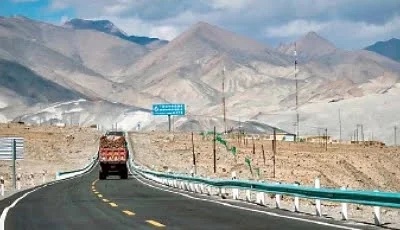ISLAMABAD:
The Pak-China Relations Steering Committee, in its maiden meeting, decided to expand its membership by bringing provinces in its fold and clarified its role in forwarding the China-Pakistan Economic Corridor (CPEC) in the presence of two other cabinet and statutory bodies.
The steering committee, which has been mandated to look after all aspects of China-Pakistan relations, met for the first time on Friday under the chairmanship of Minister for Planning and Development Asad Umar.
Main focus of the discussions was to define roles of the Cabinet Committee on CPEC, CPEC Authority and Pak-China Relations Steering Committee.
In the meeting, the committee decided to recommend Prime Minister Imran Khan to make chief secretaries of provinces, Azad Jammu & Kashmir and Gilgit-Baltistan members of the committee, said Umar.
“The purpose of the first meeting was to define and explain the role of the steering committee in the presence of Cabinet Committee on CPEC and CPEC Authority,” he said while talking to The Daily CPEC.
The Review that went on air last week, Senator Mushahid Hussain Syed of the Pakistan Muslim League-Nawaz (PML-N) said that the steering committee would undermine the role of the CPEC Authority.
Some of the participants sought clarification about the role of the new steering committee, another participant of the meeting said.
The minister said that the CPEC Authority would oversee CPEC, but the steering committee, being an interagency body, would sort out issues that may undermine the progress on CPEC.
The Cabinet Committee on CPEC would provide policy guidelines, said Umar.
Sources said that Umar during the meeting clarified that the Pak-China Relations Steering Committee had not been set up to overshadow the CPEC Authority.
A Ministry of Foreign Affairs official said that the ministry did not have objections to progressing relations with China through the steering committee.
The CPEC Authority chairman reiterated his support for the steering committee.
Sources said that Umar maintained that the steering committee’s objectives were not only CPEC specific, rather it would work to strengthen relations in all spheres.
An official statement, issued by the planning ministry, stated that in the first meeting the Pak-China Relations Steering Committee “discussed the committee’s scope and rationale”.
Prime Minister Imran Khan had recently constituted the Pak-China Relations Steering Committee to give a further impetus to implementation of projects and initiatives involving Pak-China collaboration, it added.
The establishment of the high-level forum reflects the special status of Pak-China relationship in the PM’s vision, said the planning ministry.
The meeting deliberated on the committee’s modus operandi and terms of reference (TORs) in detail, and it also solicited suggestions on how to make the committee more effective and efficient in order to further deepen Pakistan-China relations, it added.
The 15-member steering committee includes Planning Commission deputy chairman, planning secretary, foreign secretary, interior secretary, railways secretary, power secretary, finance secretary, national security adviser, CPEC Authority chairman and Gwadar Development Authority chairman.
Other members of the committee are director general of joint staff headquarters, chief of general staff/director general of military operations, chief of staff naval headquarters and director general intelligence/analysis of the ISI.
Pakistan and China had launched CPEC six years ago with an initial investment portfolio of about $46 billion, which was subsequently increased to $60 billion. However, the actual investment remained far below that mainly during the tenure of PML-N government.
The share of projects that are in the pipeline is $28 billion, according to the CPEC Authority presentation to the cabinet body in January this year.
So far, 17 projects worth $13 billion have been completed while another 21 projects having an estimated cost of $12 billion are being implemented.
The terms of reference of the committee include overseeing and steering the progress on Sino-Pak cooperation under multiple domains, reviewing progress on various projects and devising pursuance implementation and feedback systems to avoid delays.
The steering committee will also be responsible for creation of inter-ministerial synergy and removing hurdles and impediments in the way of coordination, finalisation and execution of projects.
The minister advised members of the committee that they ought to personally attend the committee meetings and should not send their subordinates to keep discussions fruitful.
















